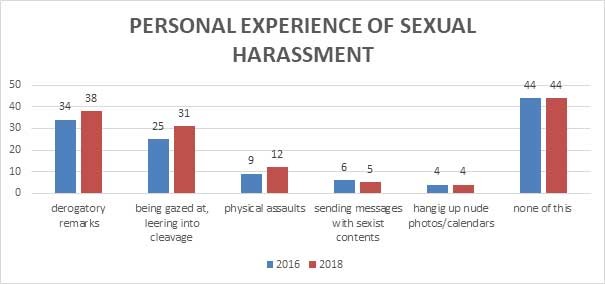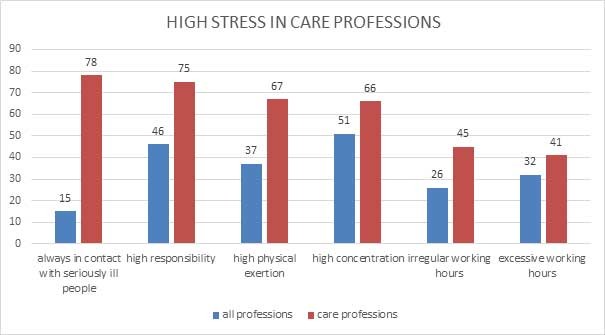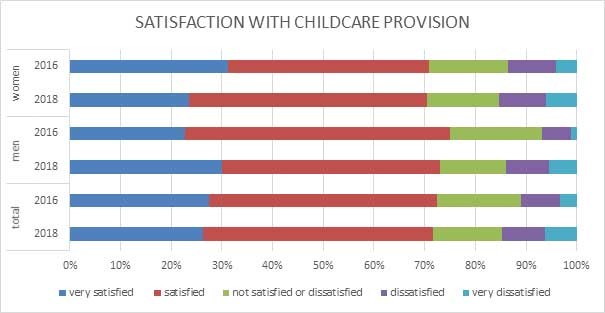Sexual harassment ist on the rise
Discrimination and disadvantage against women
Derogatory remarks, leering into the cleavage, physical assaults: the #metoo debate has heightened the sensitivity of women to sexual harassment at work.
It all began with salacious remarks followed by importunate looks on her breasts and unwelcome touching. The woman asked her colleague to stop it, but this only goaded him into further harassment. For two years, the employee suffered from sexual innuendo and assault at her workplace. Finally, she turned to the Chamber of Labour who took the case to the Labour and Social Court on her behalf. She was paid 3000 euros compensation - which, however, could not heal the mental pain and suffering.
56 percent have already experienced harassment
Many women in Upper Austria have been through similar experiences. This is also reflected in the Work Climate Index: Clearly more than half of the women have already been exposed to sexual harassment from male colleagues, superiors, or customers. 38 percent of the employees have been faced with derogatory remarks - four percentage points more than two years ago. 31 percent have been gazed at or eyed up - which is a plus of six percentage points compared to 2016. And twelve percent have suffered sexual harassment in the form of physical assaults - one third more than two years previously.
Worse off in terms of income
All in all, 28 percent of the women feel disadvantaged in working life - most frequently in the building trade, in the industry, and in trade, least often in education. Unequal pay is still the major reason for this perception: four out of ten women say that in terms of wages or salaries they are worse off than their male colleagues. Almost 30 percent feel discriminated against when it comes to promotions and jumps in the career, applications and the awarding of jobs, a little more than 20% when responsible tasks are to be assigned or undertaken. Every fifth woman feels less valued than the men in her company.
The Chamber of Labour helps women
Almost two thirds of the employed women believe that the Chamber of Labour speaks up for equality at work. Compared to 2012, this means a rise of 28 percentage points, whereas trust in the Ministry of Women’s Affairs - ranking as number two - has slumped tremendously, forfeiting ten percentage points over the past two years. The trade union comes third. Four in ten women believe that the Chamber of Labour will help them when they are disadvantaged. No other institution has been mentioned anywhere near as often as this.

Haressing women is unaccentable
COMMENT BY DR. JOHANN KALLIAUER
President of the Upper Austrian Chamber of Labour
Unfortunately, sexual harassment at the workplace is not uncommon. It is not only the wide-ranging #metoo debate that has shown that discrimination at work is the order of the day in some companies. The women concerned are often subjected to years of humiliation, degradation, verbal or - in the worst case - even physical assault. This is unacceptable!
No trivial offence
Sexual harassment is no trivial offence but a brutal act of violence apt to cause great suffering to those concerned. It is high time for companies to recognize their duty of care more than previously and to protect their female employees from (sexual) violence. The Work Climate Index has shown that women trust in their superiors to protect them in case of discrimination. Principals have to live up to this trust.
Speaking of trust, I am very happy that the women appreciate our commitment to equal opportunities at work. Almost two thirds regard the Chamber of Labour as by far the most dedicated institution in terms of professional equality. And the majority of women know that they can turn to us whenever they are discriminated against.
CARE IS FEMALE
Almost three quarters perform extra work or work overtime
In spite of the high workload and difficult reconciliation of professional and private life, employees in the care sector are satisfied with their jobs.
According to the Work Climate Index, 3.8 percent of all employees in Austria work in the nursing sector - this means approx. 140,000 employees. The share of women is 83 percent. More than half of the personnel work in private undertakings. A little over one third work part-time. The agreed working time is 34 hours on average - the actual working time approx. 36 hours. Almost three quarters have to perform extra work and work overtime at least sometimes:
Irregular working hours
90 percent work on Saturdays at least occasionally, 82 percent also work on Sundays, and 66 percent at night. Not even one third of the nursing staff have regular working hours, more than one half work in shifts or on a rotational basis - with an impact on the work-life balance: only 29 percent can easily reconcile work and private life. Nonetheless, employees in care professions show above-average satisfaction levels with work and life. And all this in spite of the high physical and mental burden.
Nine in ten are optimistic
The feeling to do meaningful work which contributes a major share to society even in the future provides for high job satisfaction. The Work Climate Index is 110 points and thus two index points above the average of other sectors. Nine in ten employees are satisfied with their jobs on the whole, 84 percent would start working with their employers again. 90 percent, each, regard the economic development and their own chances in the labour market as positive.
ILL CAREGIVERS
Rewarding, meaningful, but also very burdensome work
One third of the nursing and care personnel in Austria go to work even when they are ill - most of them motivated by a sense of duty towards their colleagues.
Four out of five caregivers are fully convinced that they do something meaningful at work - almost twice as many as on average across all sectors and professions. 90 percent also feel that they take care of other people when doing their work. The meaningful job, however, has its drawbacks: six in ten employees in nursing professions have difficulty relaxing after work, at least sometimes.
Working with sick people is burdensome
One third suffer from pressure of time, four in ten feel mentally stressed by their work. To be surrounded by sick or needy people all the time afflicts eight out of ten caregivers. Three quarters feel high responsibility. Two thirds feel stressed by physical exertion and the need to be highly concentrated all the time. A little less than one half complain about irregular and/or excessive working hours - compared to only 26 and 32 percent, respectively, in all other sectors.
Health problems caused by work
Two thirds suffer from muscle tenseness and backache - eight out of ten attribute this to work. Exhaustion, weariness and arching legs, too, are mainly ascribed to the burdensome professional activity. Things are different with headaches and migraine: while more than one half suffer from these conditions, only 20 percent put them down to their jobs.
One third go to work even when they are ill - compared to “only” 27 percent in other professions. Two thirds do this mainly out of a sense of duty towards their colleagues.

THE WORK CLIMATE INDEX
In the economic and socio-political discussions far too little attention is paid to the employees' view. This may also be due to the fact that, allegedly, insufficient solid data are available. For 21 years, the Austrian Work Climate Index has been supplying these data, and it has thus become a benchmark for economic and social change from the employees' point of view. It examines their assessments with respect to society, company, work and expectations. The Work Climate Index captures the subjective dimension, thus expanding the knowledge of economic developments and their implications for society.
The calculation of the Work Climate Index is based on quarterly surveys taken among Austrian employees. The random sample of approx. 4000 respondents each year is representative so as to enable telling conclusions regarding the mental state of all employees. Since the spring of 1997, the Work Climate Index has been calculated and published twice a year. There are also supplementary special evaluations.
DATA ONLINE
For current results and background information please refer to ooe.arbeiterkammer.at/arbeitsklima. There you will not only find the comprehensive work climate database for evaluation, but you can also calculate your personal satisfaction index with your workplace online within just a few minutes. You will also find the Executive Monitor Report online, which deals with the question of how satisfied Austrian executives are with their work.
TRADITIONAL ROLE ALLOCATION
On an average weekday, women devote 3.7 hours to children and housework, men only 1.7 hours. Both sexes spend about half an hour longer with these activities than two years ago. Nonetheless, there is still a striking difference in the distribution of domestic work: while almost three quarters of the women say that they shoulder most of the housework single-handedly, this applies to only four percent of the men, with the majority of the housework being done by their partners in 58 percent of the cases. In less than one quarter of the joint households the work to be done is shared fifty-fifty.
The unequal distribution of domestic work also affects gainful occupation and leisure time: women work shorter hours (7.5 hours) than men (8.7 hours) and have almost one hour less leisure time every day.
CHILDCARE
On the whole, parents are satisfied with what is offered
For one third of the women and one quarter of the men using childcare facilities the related cost implies a high financial burden.
The Chamber of Labour’s commitment for better childcare facilities has paid off: clearly more than one half of the working parents use crèches, nursery schools, and day-care facilities to take care of their children during the day. Vice versa, however, this means that approx. 40 percent of the parents do not do so, often because of a lack of facilities offered.
Among those who entrust their children to childcare institutions, more than two thirds are satisfied with what is offered. One quarter is even very satisfied. Over the past two years, this share has increased from 20 to 28 percent among fathers, while it has decreased from 30 to 23 percent among mothers. For exactly one third of the women - and for one quarter of the men - the cost for childcare puts a strain on the household budget.
Little consideration in companies
The share of parents who find special regulations and individual solutions for childcare in their companies has increased sharply - from twelve percent in 2012 to more than 23 percent in the years 2014 and 2016, and to even 32 percent in 2018. This means, however, that there are still two thirds of the companies not considering the needs of working parents in any way.
